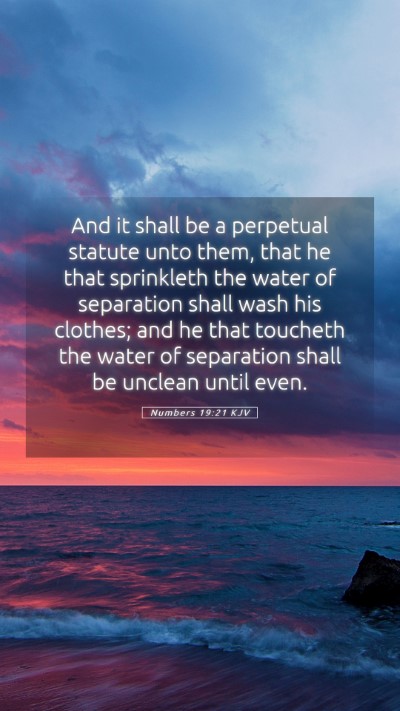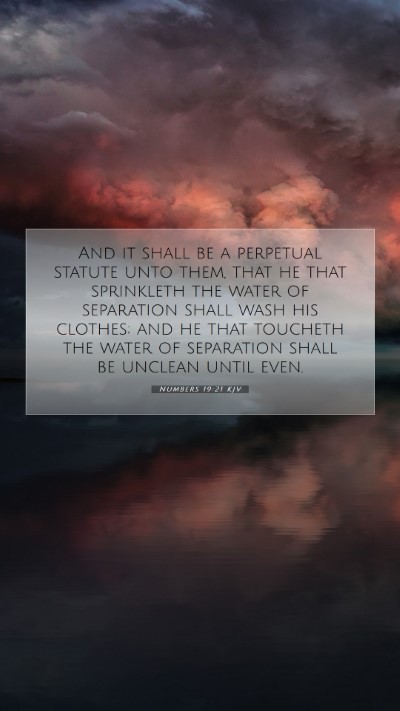Bible Verse Meaning and Commentary on Numbers 19:21
Key Verse: "And it shall be a statute for ever unto them: he that toucheth the dead body of any man shall be unclean seven days." (Numbers 19:21)
Introduction to Numbers 19:21
The verse from Numbers 19:21 is a significant element of the laws concerning purification in the Old Testament. Understanding this verse requires a comprehensive approach that encompasses Bible verse meanings, interpretations, and deeper scriptural analysis, in the context of Israel's worship and community life.
Summary of Biblical Context
In the book of Numbers, God provides the Israelites with regulations that help set them apart as a holy people. The context surrounding Numbers 19 discusses the laws of purification associated with death, focusing primarily on how to avoid defilement and maintain spiritual cleanliness.
Insights from Commentaries
Matthew Henry's Commentary
Matthew Henry emphasizes the perpetual nature of the statute given in this verse. He notes that touching a dead body renders an individual unclean, necessitating a period of separation and purification. This law reflects God's desire for holiness among His people, suggesting that death disrupts the communion with life and holiness that God intends for His creation.
Albert Barnes' Notes
Albert Barnes points out that the seven days of uncleanness prescribed for those who come into contact with the dead reflects a prolonged period of purification. This requirement underscores the seriousness of sin and death in relation to life, as well as the importance of ritualistic cleanliness in ancient Israel. Barnes further interprets this as symbolic of the greater realities of sin and the need for atonement.
Adam Clarke's Commentary
Adam Clarke provides an in-depth examination of the cultural implications of this law. He discusses how touching a corpse was seen not only as a physical defilement but also as a spiritual matter. Clarke notes that the protocol provided in Numbers 19 maintained the community's moral and spiritual integrity, offering a delineation between life and death, sacred and secular.
Significance in Biblical Exegesis
The interpretation of Numbers 19:21 allows for a deeper understanding of Biblical statutes and their application in both ancient and contemporary contexts. This verse serves as an essential teaching on the nature of sin and the purification process required for individuals to maintain holiness before God.
Application of Numbers 19:21 to Daily Life
While we may not follow the laws of purity in the same way today, the underlying messages of holiness and separation from sin remain relevant. The verse challenges believers to consider what constitutes spiritual uncleanness in their lives and how the principles of purification can be applicable in their relationship with God and each other.
Cross References
- Leviticus 11:24-28 - Laws regarding clean and unclean animals
- Leviticus 14:1-32 - The rites of cleansing the leper
- Hebrews 9:13-14 - The comparison of Old Testament purification to Christ’s sacrifice
Conclusion
Numbers 19:21 encapsulates the seriousness with which ancient Israel was to regard sin and spiritual cleanliness. It serves as a reminder that God desires His people to be pure and reflect His holiness. As we study this verse, incorporating insights from historical context, theological implications, and practical applications, we deepen our Bible verse understanding and enrich our Bible study insights.
For further study, members of Bible study groups or those engaging in online Bible study can utilize various Bible study tools and resources available to explore these themes thoroughly.


